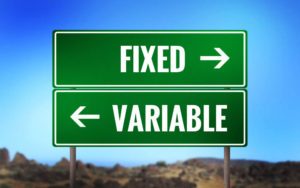 Soup or salad? Cream or sugar? Fixed or variable? The decision to go with a fixed-rate mortgage versus a variable-rate mortgage is important. Since a mortgage is the single largest debt for most families, the type of mortgage you choose can have a major bearing on how soon you reach mortgage freedom.
Soup or salad? Cream or sugar? Fixed or variable? The decision to go with a fixed-rate mortgage versus a variable-rate mortgage is important. Since a mortgage is the single largest debt for most families, the type of mortgage you choose can have a major bearing on how soon you reach mortgage freedom.
Fixed Rate
If you’re a first-time homebuyer or risk-averse (the stock market keeps you up at night), a fixed-rate mortgage may be the way to go. With a fixed-rate mortgage, your mortgage rate and payment stay the same during the mortgage term. Signing up for a fixed-rate mortgage is often referred to as “locking in.” A fixed-rate mortgage makes budgeting easier, since you don’t have to worry about your mortgage payments going up until renewal. However, this comes at a cost—fixed-rate mortgages typically come with higher mortgage rates than do variable-rate mortgages. In Canada, five-year fixed-rate mortgages are most popular
Also, if you end up breaking your mortgage for whatever reason during its term, you could pay quite a hefty mortgage penalty – the greater of 3 months’ interest or the Interest Rate Differential (or IRD for short). The IRD calculation can result in your mortgage penalty being inflated since the big banks use their higher posted rates to calculate it.
Variable Rate
For those looking to pay down their mortgage sooner, a variable-rate mortgage may be your best bet. You’ll typically get a lower mortgage rate on variable than on fixed. However, there are downsides—your mortgage rate and payment can change during your mortgage term when the bank hikes or lowers its prime rate (this often happens when the Bank of Canada changes the overnight lending rate). Although you usually have the opportunity to lock in at the fixed rate (you may want to do this when rates start to rise), by that time they may have already gone up quite a lot. Your bank is also not likely to offer you its best fixed rate, since your only other choice is to break your mortgage and pay a penalty.
Variable-rate mortgages make the most sense when interest rates stay the same or fall. A study found that homeowners would come out ahead 9 times out of 10 by going variable instead of fixed. (Keep in mind that this study took place during a period when interest rates were primarily falling.) If you believe interest rates are going up, you may be better off with a fixed-rate mortgage. If you’re planning to pay down your mortgage in five years or less, a variable-rate mortgage may make the most sense, but if it will take you longer, a fixed-rate mortgage is worth considering.
The mortgage penalties on variable rate mortgages tend to be a lot fairer. You’ll only pay 3 months’ interest if you break your mortgage. That means you won’t have to worry about being blindsided by higher mortgage penalties like you would with the fixed rate.
If you’re shopping around for mortgage rates, check out RateSupermarket.ca for the lowest mortgage rates.
Sean Cooper is the bestselling author of the book, Burn Your Mortgage: The Simple, Powerful Path to Financial Freedom for Canadians, available now on Amazon and at Chapters, Indigo and major bookstores, and as an Audiobook on Amazon, Audible and iTunes.